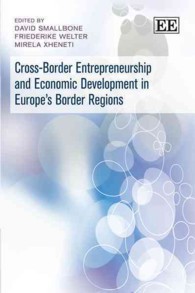- ホーム
- > 洋書
- > 英文書
- > Business / Economics
Full Description
The income gap in China has been widening since the country started economic reform in 1978. It can be said that the increasing penetration of FDI into the Chinese economy and a widening income gap among residents are two remarkable phenomena that appeared almost at the same time after China began reform and opening. People are therefore prone to correlate the two phenomena and ask: Is there a certain correlation between FDI and the widening income gap in China? If there is, how does the strength of this correlation evolve? What strength has it reached so far? How did it come into being? These are the questions this research study seeks to answer.
This book gives an in-depth analysis into the impact of FDI in China and concentrates on examining how this has led to a significant increase in the widening of the income gap which has huge implications for China. This book will appeal to anyone seeking an understanding of foreign investment in developing economies. Given the huge scope and variables in this study the research was conducted by trying dynamic panel analysis techniques with time-varying coefficients.
Contents
Chapter 1 Overview
Chapter 2 Overview of Research on the Effects of FDI on the Income Gap among Residents of the Host Country
Chapter 3 A Theoretical Model of the Effects of FDI on Income Distribution among Residents of the Host Country
Chapter 4 The Dynamic Panel Data Analysis Method 61
Chapter 5 Empirical Analysis of the Effects of FDI on the Income of Corporate Employees in China
Chapter 6 Empirical Analysis of the Effects of FDI on Employment in Chinese Enterprises
Chapter 7 Estimating a Simultaneous Equation Model of the Effects of FDI on Wage Rates and Employment at Chinese Enterprises
Chapter 8 Measuring the Effects of FDI on Income Distribution in China
Chapter 9 Main Conclusions, Policy Recommendations, and Follow-up Research
References
Postscript







